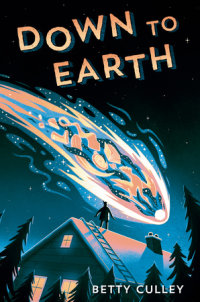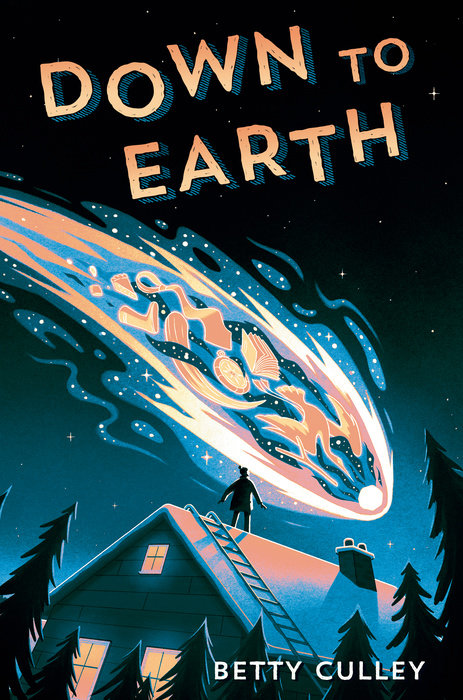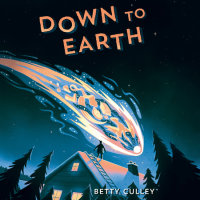CHAPTER ONE
The pointed end of a forked stick is believed to point toward the ground when it passes over water.
—The World Book Encyclopedia: Volume D
When I was five, I watched my father saw a Y-shaped twig off my great-grandfather’s hundred-year-old apple tree. I waited to see if he would cut any other letters. There were branches that would make good L’s and I’s and a curved J just right for my best friend, James. I wondered if Dad would saw off three branches and tie them together to make the H for my name—Henry.
Now I’m one hundred percent older than I was then, and when Dad circles the tree his grandfather planted on Bower Hill Road, I know he’s not looking for letters. He’s searching for the perfect forked stick for dowsing. He doesn’t dowse for buried metal or gemstones. My dad, Harlan Bower, is a water dowser and he uses his stick to find veins of water deep underground.
It doesn’t have to be apple wood. It can be pear or willow. But if I…
CHAPTER ONE
The pointed end of a forked stick is believed to point toward the ground when it passes over water.
—The World Book Encyclopedia: Volume D
When I was five, I watched my father saw a Y-shaped twig off my great-grandfather’s hundred-year-old apple tree. I waited to see if he would cut any other letters. There were branches that would make good L’s and I’s and a curved J just right for my best friend, James. I wondered if Dad would saw off three branches and tie them together to make the H for my name—Henry.
Now I’m one hundred percent older than I was then, and when Dad circles the tree his grandfather planted on Bower Hill Road, I know he’s not looking for letters. He’s searching for the perfect forked stick for dowsing. He doesn’t dowse for buried metal or gemstones. My dad, Harlan Bower, is a water dowser and he uses his stick to find veins of water deep underground.
It doesn’t have to be apple wood. It can be pear or willow. But if I ever try to dowse for real, I want my first branch to come from my great-grandfather’s tree.
Having an H name like my father doesn’t make me a dowser.
Being a Bower doesn’t make me a dowser.
Living on Bower Hill Road, with its underground springs and good-tasting well water, doesn’t make me a dowser.
My great-grandfather and grandfather could find fresh water trapped beneath hard granite rock.
Sixty-six-point-sixty-six percent of my grandfather’s sons are dowsers.
My father: 33.33 percent
Uncle Lincoln: 33.33 percent
Uncle Braggy: 0 percent
My grandfather, my father, and Uncle Lincoln all discovered their water dowser talents when they were ten. I already read about dowsing in the D encyclopedia. It tells what it is, but not why some people can do it and other people can’t.
My father taught me how to dig a hole with straight sides and how to put rubble rocks in the middle of my stone walls so they can shift with the frost.
But when I asked him how to dowse, he said it’s not something you can teach, it just happens.
I asked which was more important, the stick or the person that held it, and he said both.
I asked if it was easier to dowse for water on a rainy day and he said he’d never thought about that.
The apple tree has a black gash on the trunk where lightning hit it. No one saw the lightning strike, and the tree kept growing. No one teaches a tree to find water. Its taproot goes straight down into the earth, the same direction my father’s dowsing stick bends when it finds water.
The day I turned ten, I went up the hill and stood under my great-grandfather’s tree. It was late August and there were so many apples they pulled the branches down around me. I touched the gash where lightning marked the tree. When I looked up, all I could see were Y’s. Big Y’s, little Y’s, straight and crooked, too many to count. I traced the straightest Y with my finger, but I didn’t break it off the tree.
This perfect Y is at the very end of a branch that grows toward Nana’s front porch. It will be an easy one to find again if Dad asks me to dowse for a well. Then I’ll finally learn whether my great-grandfather’s abilities were passed down to me or not.
If I could have chosen to be a dowser for my tenth birthday present, I would have, but I know Dad would say it’s not something anyone else can give you.
CHAPTER TWO
Dowsing (water witching or water divining) is probably as old as man’s need for water. It is an “art” certain people have which enables them to find underground sources of water.
—Joseph Baum, The Beginner’s Handbook of Dowsing: The Ancient Art of Divining Underground Water Sources
Before we head out into the icy field, James breaks a branch off a wild cherry tree for his dowsing stick. I pull my little sister, Birdie, behind us on her red sled. It’s so cold out the snow that falls is gritty like sand and won’t stick. It’s the kind my father calls dry snow.
James holds the Y-shaped branch the way my father and Uncle Lincoln do when they dowse—palms up, each hand holding an end of the V, elbows at his sides, the end of the Y pointing out in front of him.
“What should I dowse for, Henry?” James asks me. “A mammoth tusk like the one we saw in the museum?”
“How about Dad’s good hammer? He lost it at the top of the field when he was fixing the tractor last summer.”
“Then I’ll dowse in that direction.” James’s eyes are the clear blue of the sky reflected in the ice, and his blond hair sticks out from under his wool hat.
“Keek keek keek.” A small hawk glides overhead.
“Keek keek,” Birdie calls back. Birdie is only two, but she can make a cry just like a hawk.
“Keek keek keek,” the hawk screeches again, and flies off into the thick woods at the edge of the field.
“I think I see something!” James yells, running ahead with his branch. “Look! A deer antler! My best find yet!” He holds up the antler. “I bet this would sell fast on the yard sale table.”
James brings over the antler, and Birdie and I touch the hard, bony points.
Then Birdie starts wiggling her legs in the sled.
“Slide down,” she says.
“Can you say ‘Push my sled, Henry’?”
I try to get Birdie to say more than two words at a time and to say my name in the sentence.
“SLIDE NOW,” Birdie tells me.
I start her sled with a gentle push, and as it picks up speed, Birdie puts her arms out like wings. The dry snow makes the sled squeak.
“You’re going fast, Birdie. Hold on to the sides!” I shout. “Steer toward the hay bales!”
Dad puts hay bales at the bottom of the hill to stop our sleds so we don’t slide out into the road. I watch Birdie zoom down the hill, the red of her mittens two bright spots moving in the air.
“I DO!” Birdie shouts back.
She doesn’t steer with her hands, but she leans her body from side to side, like a hawk in the air.
“Here, Henry.” James gives me his dowsing stick. “You take it. You’re the real dowser. I’m gonna go up in the woods and see if I can knock down some pinecones for your mom to start fires with.”
He’s sure I’m a dowser even though I haven’t dowsed for real. The last time I went with Dad on a well-drilling job, I offered to try dowsing. When I said that, Dad stood still for a second, staring at me, and answered, Lincoln could use a hand digging the drainage ditch. Which didn’t make sense, because you don’t dig the ditch until you find the spot to drill. And you don’t find the spot to drill until you dowse for it.
I think he didn’t want to watch me try and try and not be able to do it. Or hear what people in town would say when they heard what happened: Too bad that Bower boy can’t dowse like his father.
James runs across the ice, as excited about getting pinecones for Mom as he was about finding the antlers. I once heard my father say it was wonderful how James gave one hundred percent to whatever he was doing. Especially since he almost drowned with his mother when he was Birdie’s age.


